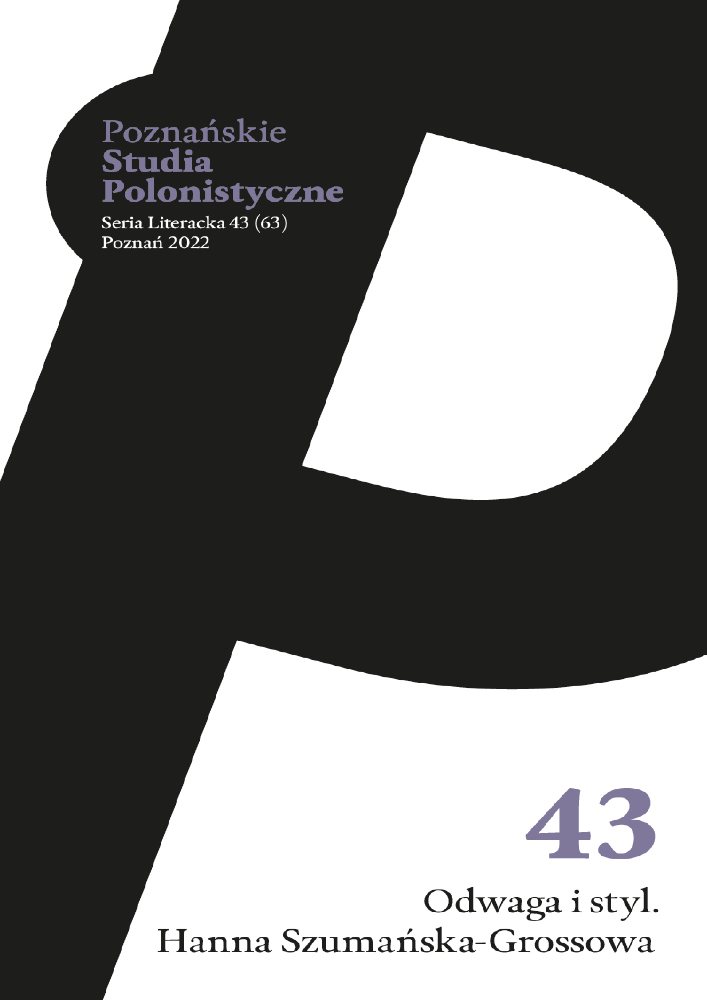Abstrakt
The article’s starting point is the consideration of selected works of Anatole France’s, André Gide’s and Guillaume Apolinaire’s, which over a hundred years ago would constitute a separate trend in the French pre-Vatican church. What differentiates the criticism of what is known as ultramontanism from the traditional anticlerical satire is the tone of persiflage, irony and theological erudition of almost grotesque proportions. In the 1950s, Roger Peyrefitte, a diplomat and a satirist of the Vatican, was an outstanding heir to this stylistic and thematic tradition. When translating his The Keys of St. Peter in 1959, Hanna Szumańska-Grossowa had to refer to the aforementioned author, who had lived half a century earlier, and work out a narrative of her own based on the achievements of J. Sten (Anatole France), Tadeusz Żeleński-Boy (André Gide) and Adam Ważyk (GuillaumeApollinaire).
Bibliografia
Apollinaire Guillaume (1958), Heretyk i S-ka, przeł. Adam Ważyk, PIW, Warszawa.
Bechtel Guy, Jean-Claude Carrière (1992), Dictionnaire de la bêtise et des erreurs de jugement. Le livre des bizarres, Robert Laffont, Paris.
Denizet Jules-Richard (1868), Les mensonges de la science et le musée rétrospectif de Saint-Germain, Librairie du Petit Journal, Paris.
France Anatol (1954), Bunt aniołów, przeł. Stefan Flukowski, Książka i Wiedza, Warszawa.
Gide André (1957), Lochy Watykanu, przeł. Tadeusz Boy-Żeleński, Czytelnik, Warszawa.
Gide André (1984), Immoralista i inne utwory, przeł. Izabella Rogozińska, wstępem opatrzył Lech Budrecki, Czytelnik, Warszawa.
Hartwig Julia (1972), Apollinare, PIW, Warszawa.
Huysmans Joris-Karl (2017), Katedra, przeł. Marcin Masny, Instytut Globalizacji, Gliwice.
Kulczycka-Saloni Janina (1995), Emil Zola – pisarz francuski, europejski, światowy, „Przegląd Humanistyczny”, t. 39, nr 6, s. 51–61.
Lanoux Armand (1957), Dzień dobry, mistrzu, przeł. Hanna Szumańska-Grossowa, w: tegoż, Wiersze, przeł. Jerzy Zagórski, PIW, Warszawa, s. 358.
Peyrefitte Roger (1958), Klucze Piotrowe, przeł. Hanna Szumańska-Grossowa, PIW, Warszawa.
Servin Michel (2003), Deo gratias, przeł. Zygmunt Szymański, W.A.B., Warszawa.
Zola Émile (1962), Lourdes, przeł. Eligia Bąkowska, PIW, Warszawa.
Licencja

Utwór dostępny jest na licencji Creative Commons Uznanie autorstwa – Bez utworów zależnych 4.0 Międzynarodowe.
Autorzy
Autorzy tekstów przyjętych do publikacji w czasopiśmie „Poznańskie Studia Polonistyczne. Seria Literacka” są zobowiązani do wypełnienia, podpisania i odesłania na adres redakcji umowy o udzielenie nieodpłatnej licencji do utworów, z zobowiązaniem do udzielania sublicencji CC.
Zgodnie z umową, autorzy tekstów opublikowanych w czasopiśmie „Poznańskie Studia Polonistyczne. Seria Literacka” udzielają Uniwersytetowi im. Adama Mickiewicza w Poznaniu niewyłącznej i nieodpłatnej licencji oraz zezwalają na użycie sublicencji Creative Commons Attribution-NoDerivatives 4.0 International (CC BY-ND 4.0).
Autorzy zachowują prawa do dalszego, swobodnego rozporządzania utworem.
Użytkownicy
Zainteresowani użytkownicy internetu uprawnieni są do korzystania z utworów opublikowanych od 2016 roku w „Poznańskich Studiach Polonistycznych. Serii Literackiej” pod następującymi warunkami:
- uznanie autorstwa – obowiązek podania wraz z rozpowszechnionym utworem, informacji, o autorstwie, tytule, źródle (odnośniki do oryginalnego utworu, DOI) oraz samej licencji;
- bez tworzenia utworów zależnych – utwór musi być zachowany w oryginalnej postaci, nie można bez zgody twórcy rozpowszechniać np. tłumaczeń, opracowań.
Do wszystkich tekstów opublikowanych przed 2016 r. prawa autorskie są zastrzeżone.
Inne
Uniwersytet im. Adama Mickiewicza w Poznaniu zachowuje prawo do czasopisma jako całości (układ, forma graficzna, tytuł, projekt okładki, logo itp.).

